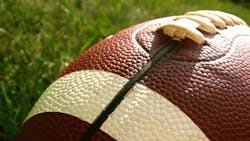Off-the-Job Safety: How to Make it Through the Turkey Bowl in One Piece
For many Americans, playing backyard football with friends and family is a Thanksgiving tradition. Unfortunately for some who partake in the "Turkey Bowl," it's a tradition that involves Advil, lost workdays and even emergency-room visits.
Around this time every year, Dr. Pietro Tonino sees a spike in sprains, contusions, broken bones and other injuries suffered in Thanksgiving pickup football games. However, Tonino points out that many of the injuries easily can be prevented.
Tonino, a sports-medicine surgeon at the Loyola University Medical Center, offers these tips to reduce the risk of Turkey Bowl injuries:
- Touch, not tackle. Tackle football greatly increases the risk of injury. Flag football reduces the risk. The safest option is touch football.
- Warm up and stretch. You're more likely to suffer injuries if your muscles are cold. Before kickoff, warm up by jogging, running in place or doing jumping jacks for a few minutes. Then slowly and gently stretch, holding each stretch for 30 seconds.
- Don't wear cleats. When you wear cleats, there's a risk that your foot will be stuck in one position while the rest of your body is moving in a different direction, leading to injury. Leave cleats to professional and competitive players. Wear gym shoes instead.
- Wear mouth guards. They cost only a few dollars, and can save hundreds of dollars in dental bills if you get smashed in the mouth.
- Wear loose-fitting clothes. For example, wear sweats instead of jeans. This will make you more flexible to reduce the injury risk.
- Act your age. If you're 40, don't try to play like you're still 20. And if you're way out of shape, don't play at all.
- Don't drink. Avoid alcohol both before and during the Turkey Bowl.
- Don't play hurt. If you get hurt on a play, stay on the sidelines until symptoms go away completely. Before returning, you should experience no pain or swelling and have normal strength and a full range of motion.
- Cool down and stretch. At the end of the Turkey Bowl, don't forget to stretch. This will help reduce muscle soreness the next day.
"Playing in a Turkey Bowl is a great way to get some exercise and burn off those pumpkin-pie calories," Tonino said. "But make sure you play smart to stay safe."
Tonino is program director of sports medicine and a professor in the Department of Orthopaedic Surgery and Rehabilitation at the Loyola University Chicago Stritch School of Medicine.
